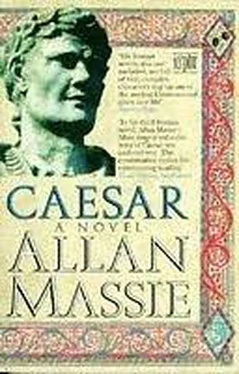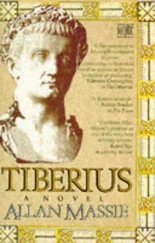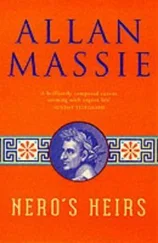Allan Massie - Caesar
Здесь есть возможность читать онлайн «Allan Massie - Caesar» весь текст электронной книги совершенно бесплатно (целиком полную версию без сокращений). В некоторых случаях можно слушать аудио, скачать через торрент в формате fb2 и присутствует краткое содержание. Жанр: Исторические приключения, на английском языке. Описание произведения, (предисловие) а так же отзывы посетителей доступны на портале библиотеки ЛибКат.
- Название:Caesar
- Автор:
- Жанр:
- Год:неизвестен
- ISBN:нет данных
- Рейтинг книги:3 / 5. Голосов: 1
-
Избранное:Добавить в избранное
- Отзывы:
-
Ваша оценка:
- 60
- 1
- 2
- 3
- 4
- 5
Caesar: краткое содержание, описание и аннотация
Предлагаем к чтению аннотацию, описание, краткое содержание или предисловие (зависит от того, что написал сам автор книги «Caesar»). Если вы не нашли необходимую информацию о книге — напишите в комментариях, мы постараемся отыскать её.
Caesar — читать онлайн бесплатно полную книгу (весь текст) целиком
Ниже представлен текст книги, разбитый по страницам. Система сохранения места последней прочитанной страницы, позволяет с удобством читать онлайн бесплатно книгу «Caesar», без необходимости каждый раз заново искать на чём Вы остановились. Поставьте закладку, и сможете в любой момент перейти на страницу, на которой закончили чтение.
Интервал:
Закладка:
"I should know who you are," I said, as we stepped into a summer night that was now cool. "But I am sorry to say I don't."
"That's natural," he said. "I was a child when we last met, and of course I have changed. Since then, I have been away. But I know you, and have heard my uncle speak warmly of your talents and character."
"Your uncle?"
"Caesar. I am Gaius Octavius Thurinus. My mother is Caesar's sister."
"But of course," I said. "Forgive me, but you were indeed a child, if an attractive one, when I last saw you, and now you are a youth — and even more attractive."
"Oh," he said, not resisting when I took his arm, "it is kind of you to say so. I have been cultivating Cicero. This term he uses, 'individualism'. I find that interesting."
"Cicero takes a Romantic idea of the past," I said. "In my opinion men have always been quick to fight for what they see as their own personal interests."
"Oh yes, I understand that, but nevertheless I think he may be right when he says that the pursuit of self-interest dominates public life, to a greater extent than it used to."
"Perhaps, but you are to remember that the competition for honour and glory has always dominated men's minds. Which of us does not seek personal glory?"
"I am sure you are right," he said, "and yet there must be a means surely of harnessing this desire to the public good; and may not Cicero be correct in saying that our ancestors found such a means, and we have lost it?"
Over the next weeks I saw much of young Octavius. I could not see enough indeed. It is not too much to say that I fell in love with him. I was charmed in equal measure by his beauty and his intelligence. Yet it was something beyond these qualities which so attracted me; even at his most affectionate, I was aware of the distance which he kept between himself and the rest of mankind — even a lover. It was a distance I longed to bridge, and my failure to do so intensified my passion. Even as I kissed his lips and felt his arms steal round my neck and his smooth limbs intertwine with mine, I was conscious that something of him stood apart, that he never surrendered himself even to the pleasures in which he delighted, that he was always observing all that we did, and exercising judgment in his uncanny detachment. It was this quality which so inflamed me. In love we always seek possession, and yet the closer I held him to me, the less I was able to take possession of his essential being.
At one moment he seemed only a boy delighting in his beauty, and in the admiration which he aroused in me. Certainly, he sought admiration. He would lie naked, inviting me to stroke his shapely thighs (which he sha ved and oiled with great attent iveness), murmuring as my lips moved over his flat smooth belly, caressing my neck and shoulders and running his fingers down the line of my back. His joy was real as mine, and yet he remained aloof, superior, remote, as if he observed all at a great distance. Even Clodia could not surpass his ability to tantalise a lover.
The philosophers declare that the love between a man and a youth may be the noblest of emotions. They assert that the mature lover schools his friend in wisdom and virtue. I know the theory well. But it was not like that with Octavius, and I believe it rarely is. I was enthralled, and, being enthralled, diminished. If I were to approach Artixes (to whom I shall of course not read these pages of my memoir) as I approached
Octavius, then I might indeed enjoy what philosophers promise. But Octavius, though a youth, seemed older and wiser than I. I was for those weeks his slave, as I had been Clodia's.
I neglected my wife for his sake. Longina was the daughter of Caius Longinus Cassius. I had married her a few months previously at Caesar's urging, to cement, as he put it, Cassius' reconciliation to our party. She was not much more than a child, charming, vivacious, ignorant, and, I thought then, vicious. She had little to offer one who had enjoyed the embraces of Clodia, and I soon found she bored me. She adored dice and gossip, and she had a circle of dissolute boys of her own age, who had, as my mother would have put it, more money than sense. I was soon convinced that she betrayed me with more than one of them. I suppose it is fair to admit that I bored her also. She could be a charming companion, and she was certainly very pretty, but she never, at that period, said anything that remained in my mind for longer than the time she took to utter it.
Nevertheless one good thing came out of my marriage: I learned to know my new father-in-law, Cassius. Cassius had always been an object of some suspicion to us Caesarians. We respected his military record, of course; it was Cassius who, as praetor, had extracted the remnant of Crassus' army from the disaster of Carrhae. That was no mean achievement. We knew too that, if Pompey had followed his advice, our campaign in Greece would have been even more perilous and difficult than was the case. But few trusted him; his sardonic tongue wounded easily, and, it seemed, with pleasure. Even Caesar was not comfortable in his presence, complaining of his "lean and hungry look". He tried to laugh off the unease Cassius occasioned. "Let me have men about me that are fat."
Now Cassius said to me:
"Has it occurred to you that the State is out of balance? I yield to none in my admiration for Caesar's genius, and I know that you, Decimus, are his most loyal adherent. But… I belong to the Epicurean persuasion, you know, and we believe that there must be a measure in all things; nothing to excess. Isn't Caesar's preponderance in the State somewhat excessive? His glory outshines all others. The splendour of his sun casts all others into the shadows. How long do you suppose Roman noblemen, reared, as we all are, in a tradition which lays such great stress on virtue and personal achievement, will be content to lie in obscurity as a result of the light that is concentrated on Caesar?"
"These are dangerous thoughts."
"But they are only thoughts, words taking the air, philosophical speculations, no more than that." He poured wine.
"Cicero," I said, "has been talking of the dangers of what he terms 'individualism'. Are you saying the same thing?"
"Cicero, let us agree, is an old windbag. We have always striven to excel, and what is that strife but the individualism he has now discovered? But formerly, the contest was one in which any man of noble birth might hope to triumph. It was agreed that that triumph should not be enduring; that others must have their turn in the limelight, while men of outstanding merit rested in the background ready to resume their labours if the State required their service. But now? Things are different, aren't they? Caesar's pre-eminence is such that we find ourselves asking whether we serve Rome or Caesar."
"Young Octavius" — to my annoyance I felt myself blushing as I pronounced his name — "suggested to me that our ancestors found a means of harnessing the desire to excel to the public good, which we, in our generation, have lost."
"That young man would be wise not to let his uncle hear him speak in that vein. But he is right. The question is: what should be done? Do you think, Decimus, that it might be possible to persuade Caesar to retire from public life? There is, after all, the example of Sulla."
"Sulla is not a name to mention to Caesar, especially not as a pattern he might follow."
"I understand that. I am not speaking idly, Decimus, as Cicero now speaks. Caesar is heading for trouble. The more he separates himself from his natural peers, the more he stands alone in his glory, the more surely he breeds discontent. The last public service Caesar could do would be to withdraw, to devote his talents to the practice of literature perhaps. After all, he often says that that is his chief joy in life. I don't believe him, of course; everyone knows he prefers women and war. But that is no reason why he shouldn't be taken at his word. I was never worried by Pompey's pre-emin ence because I always knew that Pompey was more show than substance. But Caesar is a different matter. His pre-eminence is real. That is why it is dangerous: for him and for Rome."
Читать дальшеИнтервал:
Закладка:
Похожие книги на «Caesar»
Представляем Вашему вниманию похожие книги на «Caesar» списком для выбора. Мы отобрали схожую по названию и смыслу литературу в надежде предоставить читателям больше вариантов отыскать новые, интересные, ещё непрочитанные произведения.
Обсуждение, отзывы о книге «Caesar» и просто собственные мнения читателей. Оставьте ваши комментарии, напишите, что Вы думаете о произведении, его смысле или главных героях. Укажите что конкретно понравилось, а что нет, и почему Вы так считаете.












